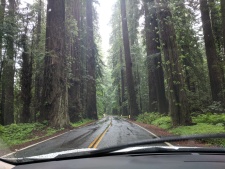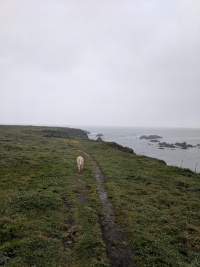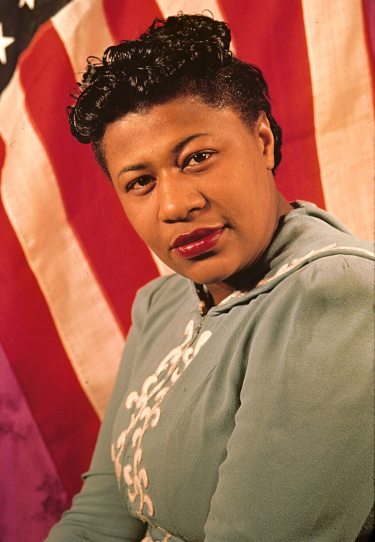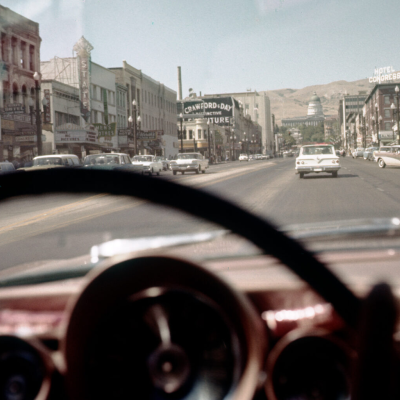.
.
.
_____
.
.
New Jazz Music Recommendations
.
.

In the rainy Redwood National Park

On a bluff above the Pacific, just north of Mendocino
While much of the listening for this month’s edition of “On the Turntable” took place, as always, while walking the sidewalks and paths of Northeast Portland neighborhoods and parks, much of it also took place during a mid-May car trip to visit dear friends in California, along the winding roads of southern Oregon and the rain-drenched redwood forests south of Eureka. The mostly poor weather prevented lengthy sojourns into the wild, but there were occasional opportunities to take the listening outdoors, along a bluff just north of Mendocino, for instance.
In addition to being in the company of my impressively loyal and patient dog, I had a variety of interesting sounds to accompany me along the way. These are six recently released jazz albums (and 18 songs) that caught my attention in May.
.
(Songs from this playlist are available on Spotify and other music streaming services, and of course at your local music store)
.
.
.
Joshua Redman, Come What May (Nonesuch)
.
We have been treated to great performances and recordings by Joshua Redman since his debut for Warner Brothers in 1993, and his latest, Come What May, is another example of his genius. Filled with wonderful rhythmic hooks and Redman’s boisterous, confident play, he reels us in throughout with intense creativity and frequent charm — supported by a rhythm section (pianist Aaron Goldberg, drummer Gregory Hutchinson, and bassist Reuben Rogers) he first assembled twenty years ago, but this being only their third recording together. There are seven tunes on the album, all with merit, but three of particular note to immediately recommend, two with inspired and catchy hooks – “I’ll Go Mine” and “Stagger Bear,” and one with a sensitive, wistful melody, “Come What May.”
.
.
_____
.
.
Joe Lovano, Trio Tapestry (ECM)
.
Another brilliant saxophonist I was fortunate to spend time listening to this past month, Lovano has been on the scene for 40+ years, recording as a leader and sideman on a diverse array of recordings, often a leading exponent of expanding the music’s vernacular. Together with pianist Marilyn Crispell and percussionist Carmen Castaldi, on Trio Tapestry (his first as a leader for ECM) Lovano blends elegance with atmosphere and creates a whispered language that often results in provocative imagery wherever you allow it to take you – for me it was fog rolling through the Golden Gate, a meaningful walk in the woods, a tender embrace at dawn. On a record like this, the opportunities for exploration are not confined to the musicians. Turn down the lights and see what happens. “Mystic” is spacious and at times completely serene; “Seeds of Change” is delicate and gorgeous, one of the prettiest melodies you may hear for awhile; Crispell’s Satie-like piano on “Razzle Dazzle” leads into Lovano’s expressive, breathy meditation. This is a highly recommended recording…
.
.
.
_____
.
.
Matt Brewer, Ganymede (Criss Cross)
In this recording – a sophisticated and often blistering session – the talented and revered bassist Brewer leads a sensational trio that includes the saxophonist Mark Shim and the drummer Damion Reed. The album’s ten pieces are demanding and rewarding, and include four Brewer original compositions, as well as little known tunes by the likes of Ornette Coleman, Ron Carter, Joe Henderson and Dewey Redman. It’s easy to work up a sweat listening to this record, as the trio’s essential core is its pace, energy and vitality. Three pieces to recommend that I keep returning to: Henderson’s dynamic “Afro-Centric”; the freedom found within “Psalm” (Shin particularly shines here); and the relative calm of the classic “When Sunny Gets Blue.”
.
.
.
_____
.
.
Tom Harrell, Infinity (High Note)
.
Tom Harrell is a gifted, unassuming, first-rate trumpeter — always has been, likely always will be. His new recordings are always welcome, and are consistently warm and inventive – his compositions are progressive but eminently listenable. While his sound and style can often seem conventional, it is almost always a blissful, delightful, and compelling listening experience. The entirety of Infinity is as comfortable as a favorite ball cap worn on a Sunday afternoon stroll. Check out “Blue,” an infectious bebop tune with Harrell’s lovely tone mingling seamlessly with that of the brilliant saxophonist Mark Turner. “Dublin” is an instant joy of a melody, again with Turner and Harrell feeding off of one another, and on “Hope,” Harrell treats us to a delicate Miles-like mute.
.
.
.
_____
.
.
Zela Margossian, Transition (Art as Catharsis)
.
This is one helluva likeable record. Ms. Margossian is a skilled composer/pianist whose music is entrenched in her Armenian heritage. Her debut recording, Transition is dominated by the brightness of her sound and an effervescence of spirit, especially on display when in tandem with the colorfully rich reeds of Stuart Vandergraaff. At its best, her work transports the listener to several corners of the world, and offers a taste of multiple musical disciplines. Three pieces to recommend: “Ceasefire” is vivacious and wonderfully infectious, and alone worth the price of admission. “Shounch (Breath/Inhale)” is more tranquil and laid-back, but no less fascinating. “The Child in Me” offers perhaps the best glimpse at her significant virtuosity. This feels like a serious debut…Check it out.
.
.
.
_____
.
.
Aaron Burnett and The Big Time Machine, Anomaly (Fresh Sound New Talent)
.
There is a relentless and frenetic Dolphy-esque tension running throughout the saxophonist Burnett’s album – and that’s a wonderful thing. It is one of those records that challenges and excites, that tantalizes the listener with great musicianship (whether they are playing bop or free) and occasionally makes things a wee bit uncomfortable. The eight compositions are intelligent and weighty (and lengthy), and the talented group (the vibraphonist Joel Ross and the drummer Tyshawn Sorey are terrific) share plenty of entertaining improvisational ideas. My favorites — ”Picassonite”,”Light Beings” and “No More Bebop” – may not be tunes to spin during the summer neighborhood street party, but they are extraordinary discoveries for the man-cave/she-shed.
.
.
.
“On the Turntable” — June, 2019
“On the Turntable” – May, 2019
“On the Turntable” – April, 2019
“On the Turntable” — March, 2019
“On the Turntable” — February, 2019
“On the Turntable” — January, 2019
.
.
.







































